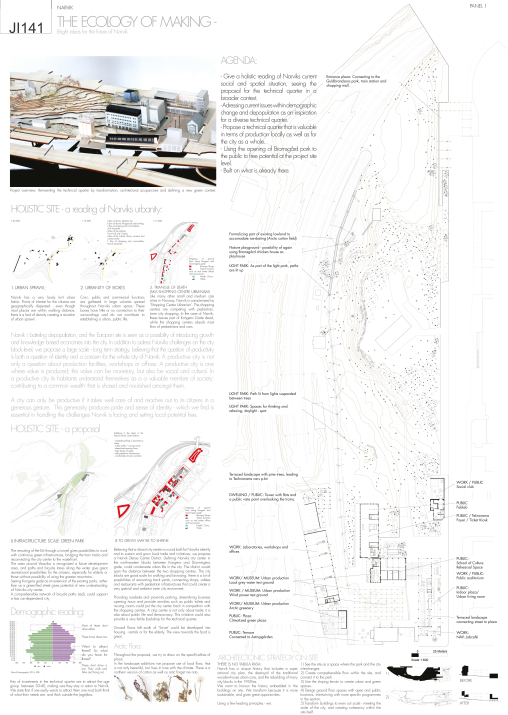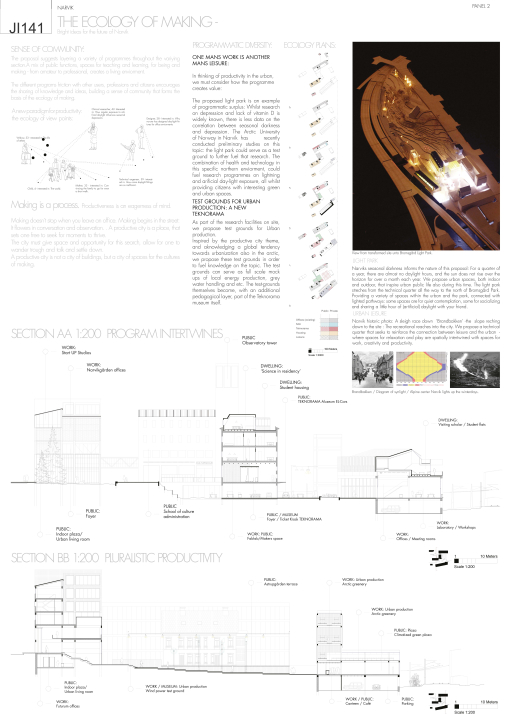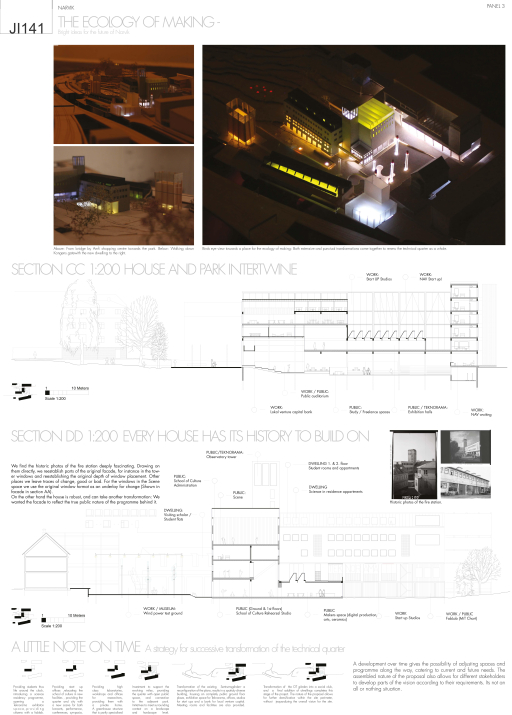Project:
The Ecology of Making
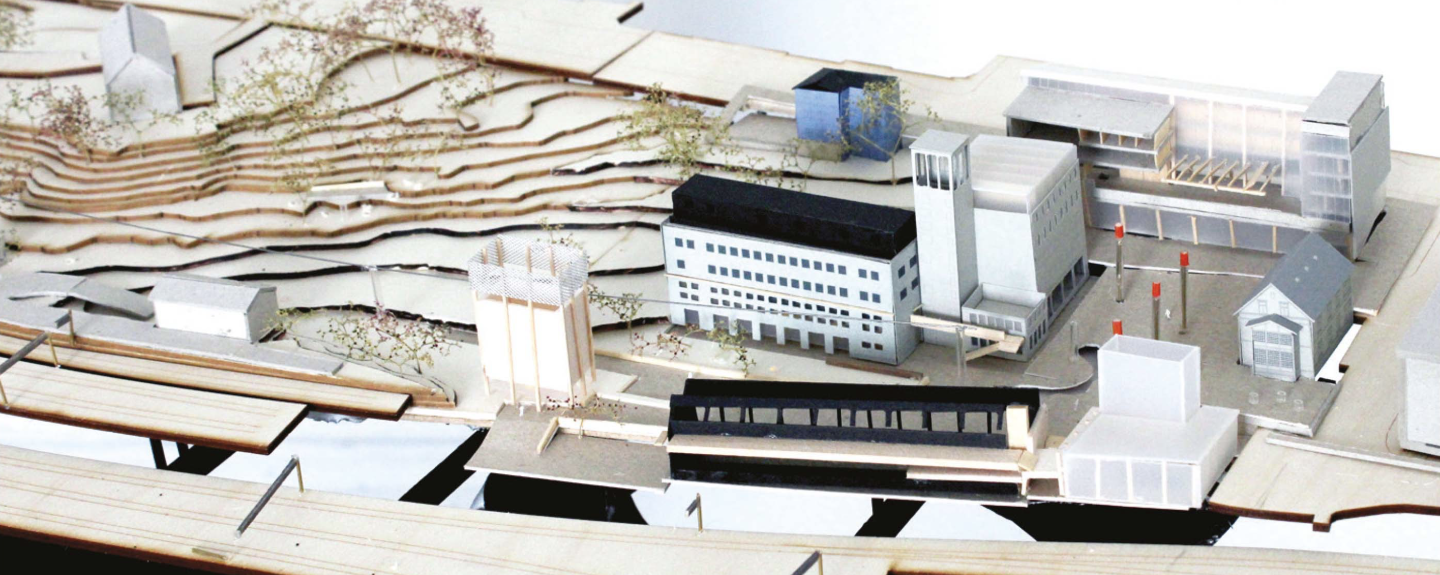
About
-
The Ecology of making is a holistic vision for a development of the technical quarter in Narvik. The project offers a reading of Narvik as a whole, both spatially and socially, arguing that ideas on productivity cannot be limited to a singular, isolated place. The project proposes architectural transformations and punctual additions, building on the eclectic history of the site.
The project suggests an ecology of making: An ecology of programme, space and connections that understand productivity as a living organism. Weaving the project site into the adjacent Bromsgård Park, the project does not propose clear boundaries between leisure and work, nor between learning and researching.
A productive city is not only a question about production facilities, workshops or offices. A productive city is one where value is produced; this value can be monetary, but also be social and cultural. In a productive city its habitants understand themselves as a valuable member of society: contributing to a common wealth- that is shared and nourished amongst them. A city can only be productive if it takes well care of and reaches out to its citizens in a generous gesture. This generosity produces pride and sense of identity-which we think is essential in handling the challenges Narvik is facing and setting local potential free.
The proposal suggests layering a variety of programmes throughout a variety of sections. A mix of public functions, spaces for teaching and learning, for being and making-from amateur to professional, creates a living environment. The different programs friction with other users, professions and citizens encourages the sharing of knowledge and ideas, building a sense of community that forms the basis of the ecology of making.
Making doesn’t stop when you leave an office. Making begins in the street: It flowers in conversation and observation. A productive city is a place, that sets one free to seek for moments to thrive.The city must give space and opportunity for this search, allow for one to wander through and talk and settle down. A productive city is not a city of buildings, but a city of spaces for the cultures of making.
-
The Ecology of Making proposes a holistic and gradual strategy for transforming Narvik’s Technical Quarter into a productive area for all, arguing that production means more than just economic activity. It builds from a sensitive reading of Narvik’s urban form, its past development, and its future trajectory to inform a highly contextual urban strategy that expands beyond the boundary of the site. The jury commends how the proposal tackles the Arctic’s long winter nights through the light park that uses artificial lighting combined with landscape as a tool to link the site with the park and the wider city, and create a convincing new public provision that remain vibrant through- out the year. This new public space links together the other program- matic elements, and aims to counter what they describe as the Shop- ping Centre Urbanism of Narvik.
However, the jury finds the architectural proposals less convincing. The presentation lacks clarity and the architecture appears disordered with no identifiable unifying ideas. Larger scale spatial rep- resentations of the proposals would have been welcome to describe the atmosphere and human experience. The jury also questions the low-density approach, which is contradictory to clients aim to make the site the new melting point of Narvik. With the proposed reduction of density of the site, it is hard to see how this project could realize its potential.
Overall The Ecology of Making comprehensively answers the brief with a convincing and sensitive urban strategy that addresses the city beyond the site and makes a strong argument for a broader reading of what productivity in cities means.
-
Team Representative: Dominique Hauderowicz (DK) – architect
Associate: Kristian Ly Serena (DK) – architectFrederiksborgvej 64, DK-2400, Copenhagen NV (DK)
+3345 60082087 – info@studiofountainhead.dk – studiofountainhead.dk
D. Hauderowicz & K. Ly Serena
Team interview
1. How did you form the team for the competition?
Studio Fountainhead is an established architecture office founded in 2013 by Dominique Hauderowicz and Kristian Ly Serena. We do not believe in large teams and have therefore decided - for the Europan competition as well for our other assignments - to work as a couple. Because we know each other so well, this means, we are working as one mind and not as a team.
2. How do you define the main issue of your project, and how did you answer on this session main topic: the place of productive activities within the city?
With our project for Narvik, Norway, “The Ecology of Making“ we are trying to give our reading of productivity within a present urban community. The proposed architecture is drawn as a direct impression of this set of rather political ideas. We do not see productivity as something that is contained or sustained within a building or any other spatial limitation. Rather, we consider the productive city as a city that allows or contributes to the cultures of making. In our project material we write: “Making doesn´t stop when you leave an office. Making begins in the street: It flowers in conversation and observation. A productive city is a place, that sets one free to seek for moments to thrive. The city must give space and opportunity for this search, allow for one to wander through and talk and settle down. A productive city is not a city of buildings, but a city of spaces for the cultures of making. Making is a process: Productiveness is an eagerness of mind.” This means that working with a productive city means to work with all facets of life, from dwelling to recreation, work and institutions. It is about giving opportunities for playfull, creative lifestyles, that can nourish the kind of research needed for a flourishing business of tomorrow.
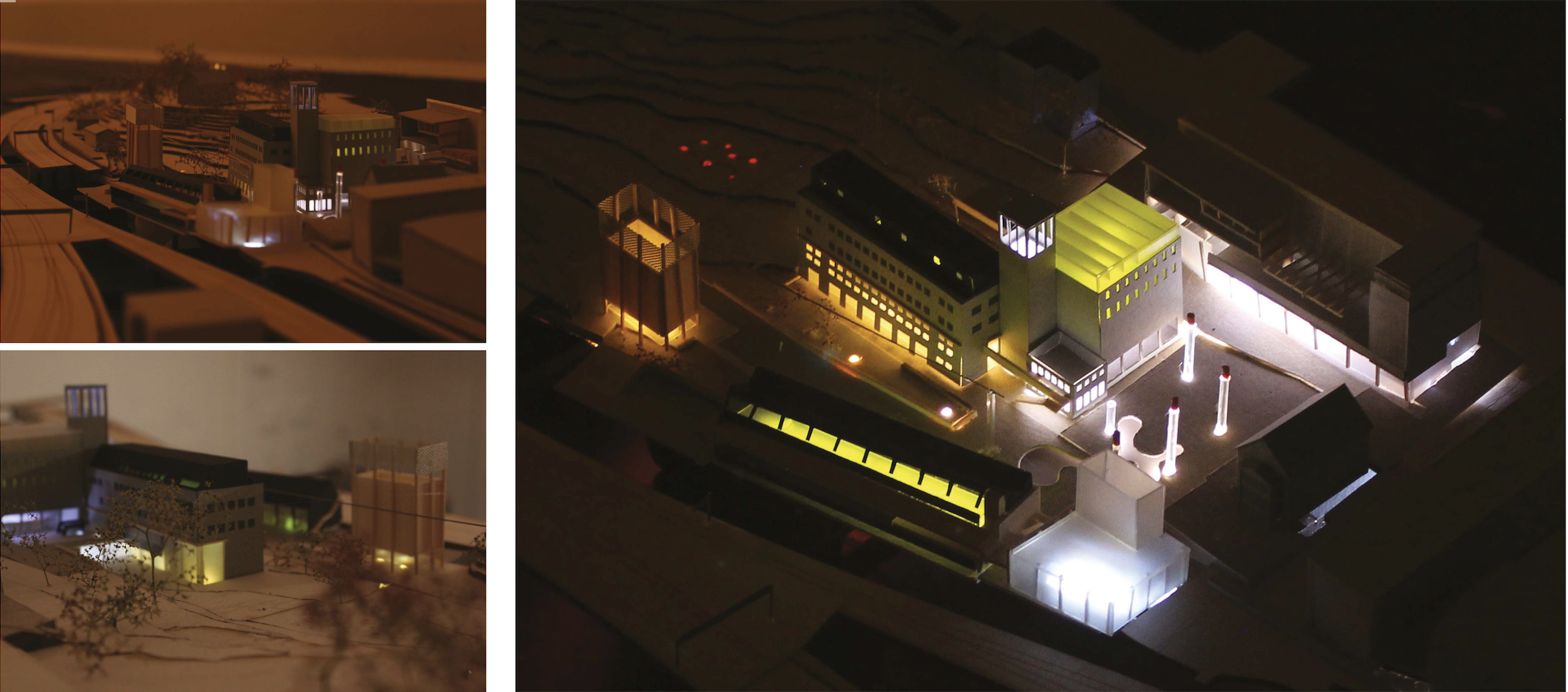
3. How did this issue and the questions raised by the site mutation meet?
In our project these principal ideas have met the site specifics. Our primary architectural strategies for the project have been to work with the public space as an integration of the recreational, the workplace, the dwelling and the culture and educational institution into an “Ecology of Making”. This has been achieved through various transformation of existing building volumens, additions of new volumens and landscapes. We have therefore extended the understanding of the building site to also incorporate the adjacent park. Emphasis has been put on the spatial transitions between the various programs and the public space. This has resulted in new public assesses, and a stronger spatial contact between the different actors of the project; all to bring forth a more inspiring and catching urban atmosphere.
4. Have you treated this issue previously? What were the reference projects that inspired yours?
Europan 14 is the first time we draw specifically for “the productive city”, though many ideas and thoughts resonate within the body of projects that we have developed throughout the past four years.
5. Urban-architectural projects like the ones in Europan can only be implemented together with the actors through a negotiated process and in time. How did you consider this issue in your project?
Because the actual program - who would inhabit what in the project - was very unclear in the project brief, and very much but out for discussion, we decided to draw the project so that it is easily adaptable for a long-time implementation process. Each of our transformations or additions can therefore be altered without harming the overall architectural idea of the project.
6. Is it the first time you have been awarded a prize at Europan? How could this help you in your professional career?
This is our second time participating in Europan. We both got awarded a prize in this and the previous round, where we got a 2° prize for the large scale harbour renewal project “More Tronheim” in Trondheim, Norway.

Related projects
-
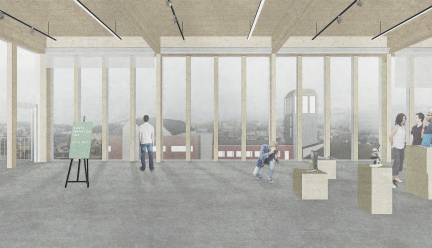
On Reflection
On Reflection is a rich and complex architectural micro-cosmos in the center of Narvik.
-
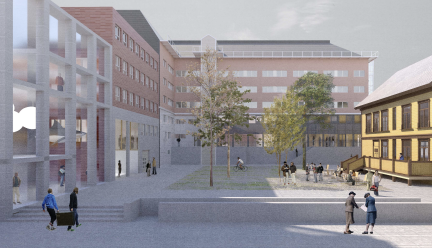
From Backyards to Courtyards
We identify a great potential, we search for an intensification of existing places and the…
-

The Ecology of Making
The Ecology of making is a holistic vision for a development of the technical quarter in Narvik.
